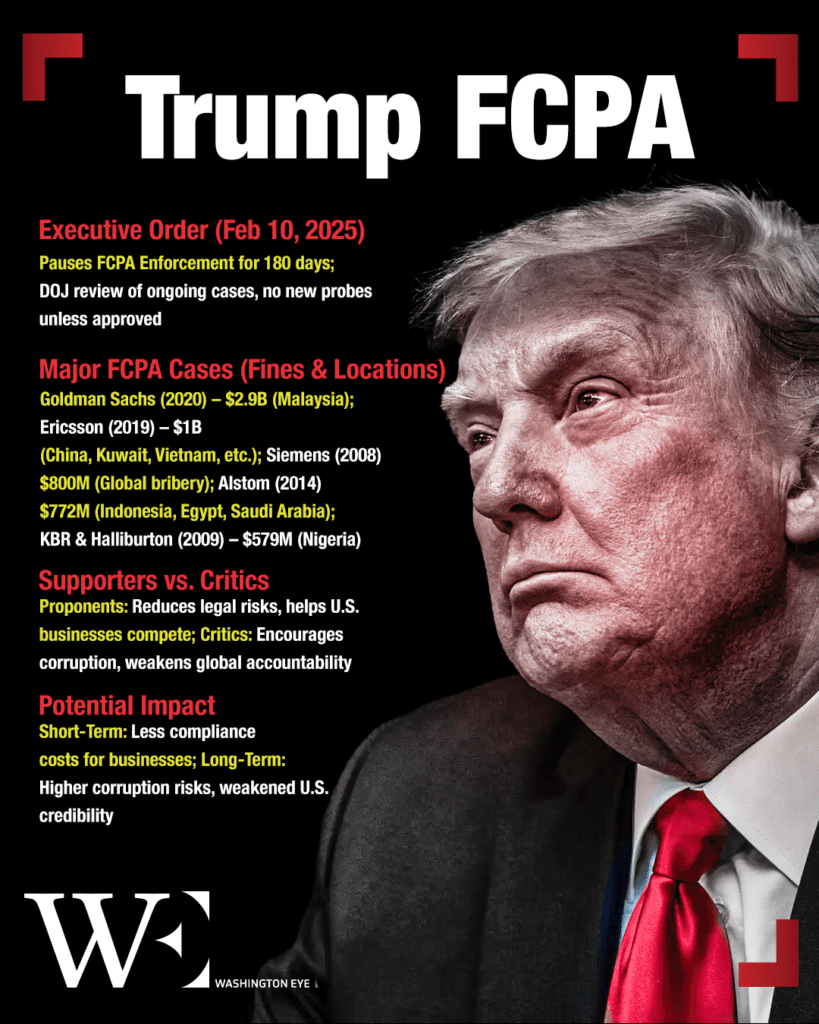On February 10, 2025, President Donald Trump signed an executive order directing the Department of Justice (DOJ) to temporarily halt enforcement of the Foreign Corrupt Practices Act (FCPA) of 1977.
This law prohibits U.S. companies and individuals from bribing foreign officials to secure or maintain business.
The administration argues that strict enforcement of the FCPA has put American businesses at a competitive disadvantage, as international competitors often operate under more lenient regulations. The White House has stated that reducing enforcement will prevent unnecessary legal burdens on U.S. businesses and allow them to compete more effectively on the global stage.
180-Day Review Period
The executive order calls for a 180-day review period in which the Attorney General will assess all ongoing FCPA investigations and enforcement strategies. During this time, no new investigations will be launched unless explicitly authorized by the Attorney General.
The purpose of the review is to develop revised enforcement guidelines that balance the need to combat corruption with the goal of promoting U.S. economic interests abroad.
Criticism and Concerns
Opponents of the move warn that pausing FCPA enforcement could lead to increased corruption and damage the United States’ international reputation as a leader in anti-corruption efforts. Gary Kalman, executive director of Transparency International U.S., criticized the decision, stating that it could undo decades of progress in curbing global bribery.
Past Impact of the FCPA
The FCPA has historically played a critical role in prosecuting corporate corruption cases. In 2020, Goldman Sachs agreed to a $2.9 billion settlement over its involvement in the 1MDB bribery scandal, while in 2019, telecommunications giant Ericsson paid over $1 billion to resolve bribery allegations spanning multiple countries.
Critics argue that suspending enforcement could encourage unethical business practices and weaken global anti-corruption standards.
Support from the Business Community
Proponents of the executive order claim that it will level the playing field for U.S. businesses operating internationally. Many corporate leaders argue that previous FCPA enforcement measures were excessive and unpredictable, discouraging companies from pursuing international opportunities.
The administration believes that revising enforcement guidelines will provide greater legal clarity and enable American firms to operate more competitively.
What Comes Next?
As the DOJ undertakes its review, the outcome will have far-reaching consequences for both American businesses and global anti-corruption efforts. Supporters believe the pause will lead to a fairer and more predictable regulatory environment, allowing U.S. companies to compete on equal footing with international rivals.
However, critics worry that scaling back enforcement could weaken corporate accountability and embolden unethical practices.
The new guidelines, once released, will determine whether this policy shift strengthens American economic competitiveness or undermines longstanding efforts to combat corruption worldwide.














